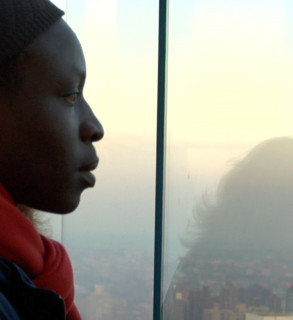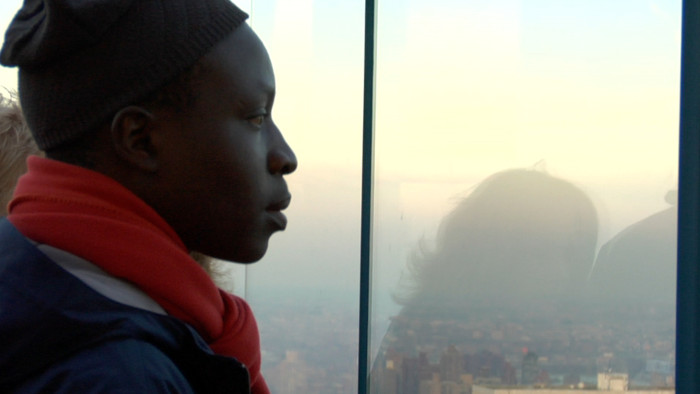6 Questions: Ben Nabors

This is the sixth installment in our 6 Questions series, where we email creators, curators, and other people we admire with 6 questions about their work and process, and then share their responses with you. You can read our previous interview with skateboarder/filmmaker Colin Kennedy here. -Ali

A still from William and the Windmill.
Ben Nabors is incredible. Not only does he make critically-acclaimed films including William and the Windmill, he also finds the time to run the creative collective {group theory}, which seems to be putting out another impossibly cool new project every time we check up on them. We talked to Ben about the work he does, and here’s what he had to say:
1. Tell us about the day-to-day logistics of filming William and the Windmill. What was it like being a part of William’s world but limited to the role of an observer/recorder?
This film took more than 5 years to make, and over that amount of time real relationships can develop. To speak in general terms, I think it’s clear from the story that the filmmaker grows close to the film subject, and the process of making the documentary comes to influence the film itself. These were unintended outcomes of the documentary process, but they happened nonetheless. For that reason, in presenting the film we felt it was necessary that I be a part of the story, and thus be implicated in some of the transitions that occur in William’s life.
2. When you started filming, did you have an idea of how complicated William’s story would be? How did it affect your approach when you realized that it may not follow the traditional hero narrative?
I was initially drawn to William’s creation of the windmill, and when our project began, that invention was the focus of our work. As time passed, the other changes in William’s life — educational opportunities, international fame, cultural transition, a changing family dynamic — became central to his experience, and therefore to me. So that said, the film arc doesn’t follow a traditional (or expected) hero narrative, but I don’t think this makes William any less heroic. In fact, in light of the hyper contemporary struggles and challenges that he faces during the narrative, I think he’s even more of a modern hero than audiences know. To have avoided the drama present in William’s transition from Malawi to the West would have diminished his incredible poise and accomplishment, and I didn’t want to overlook the full range of his achievement.
3. It’s a big responsibility to tell the story of someone else’s life. What do you do to make sure that your documentary work is honest, but entertaining at the same time? Or do you think that films should be either one or the other?
It is a big responsibility, and throughout the process of making this film, we consistently checked ourselves against questions of honesty and authenticity. Of course, this cuts both ways. Not only must we be honest to the subjects in the film, but we also have to be honest with ourselves and what we observe and experience while making the film. If a film remains authentic to the experience of the filmmakers, it holds on to truth.
4. Documentaries seem to be having a moment right now. Why do you think people are drawn to them at this point in time?
There are a lot of theories to explain why documentaries are so popular. Some people think it’s because of an acquired appetite through the format of reality TV. I’ve also heard that it has to do with new distribution platforms (Netflix, for example) that bring previously unseen genres like documentaries to new audiences. I don’t think either of these are completely true. I believe documentaries are appreciated because the craft is improving, and the work is compelling. Good stories surface, regardless of genre, and there are a lot of excellent documentary storytellers practicing right now.
5. Tell us about the model behind the collaboration-driven production studio you founded, {group theory}. What led you to start {group theory} and how does the concept of “collaboration” end up functioning in real life?
Before founding my studio, I had the opportunity to work in creative businesses that were very hierarchical. From my perspective, that need for hierarchy became a hinderance, and functioned more to push new people and ideas away rather than nurture them. At {group theory}, we try to establish a collaborative atmosphere, with the assumption that good ideas can come from anywhere and talented people want to be treated like owners rather than employees. Of course, there is structure to the day and there is order, but there’s also a necessary community spirit.
6. What’s one thing you learned in the process of making William and the Windmill that you will take with you to either the next project, or life in general?
As a documentary filmmaker, I try to walk into a situation with a sense of openness, rather than a pre-established storyline that I try to illustrate. Some filmmakers are essayists, and construct great work by following a pre-existing argument. I’m not good at that. I like to walk into a room and not know what’s going on. I find that my best footage comes from a perspective of confident curiosity. Truth is stranger than fiction, sometimes, and I’m going to hold on to that.

